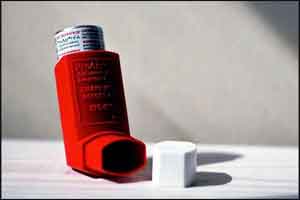- Home
- Editorial
- News
- Practice Guidelines
- Anesthesiology Guidelines
- Cancer Guidelines
- Cardiac Sciences Guidelines
- Critical Care Guidelines
- Dentistry Guidelines
- Dermatology Guidelines
- Diabetes and Endo Guidelines
- Diagnostics Guidelines
- ENT Guidelines
- Featured Practice Guidelines
- Gastroenterology Guidelines
- Geriatrics Guidelines
- Medicine Guidelines
- Nephrology Guidelines
- Neurosciences Guidelines
- Obs and Gynae Guidelines
- Ophthalmology Guidelines
- Orthopaedics Guidelines
- Paediatrics Guidelines
- Psychiatry Guidelines
- Pulmonology Guidelines
- Radiology Guidelines
- Surgery Guidelines
- Urology Guidelines
Vitamin D protects against severe asthma attacks

Taking oral vitamin D supplements in addition to standard asthma medication could have the risk of asthma attacks requiring hospital attendance, according to research led by Queen Mary University of London (QMUL).
Asthma affects more than 300 million people worldwide and is estimated to cause almost 400,000 deaths annually. Asthma deaths arise primarily during episodes of acute worsening of symptoms, known as attacks or 'exacerbations', which are commonly triggered by viral upper respiratory infections.
Vitamin D is thought to protect against such attacks by boosting immune responses to respiratory viruses and dampening down harmful airway inflammation.
The new study, funded by the National Institute for Health Research, and published in The Lancet Respiratory Medicine, collated and analysed the individual data from 955 participants in seven randomised controlled trials, which tested the use of vitamin D supplements.
Overall, the researchers found that vitamin D supplementation resulted in:
- a 30 percent reduction in the rate of asthma attacks requiring treatment with steroid tablets or injections - from 0.43 events per person per year to 0.30.
- a 50 percent reduction in the risk of experiencing at least one asthma attack requiring Accident and Emergency Department attendance and/or hospitalisation - from 6 percent of people experiencing such an event to 3 percent.
Vitamin D supplementation was found to be safe at the doses administered. No instances of excessively high calcium levels or renal stones were seen, and serious adverse events were evenly distributed between participants taking vitamin D and those on placebo.
Lead researcher Professor Adrian Martineau said: "These results add to the ever-growing body of evidence that vitamin D can support immune function as well as bone health. On average, three people in the UK die from asthma attacks every day. Vitamin D is safe to take and relatively inexpensive so supplementation represents a potentially cost-effective strategy to reduce this problem."
The team's use of individual participant data also allowed them to query the extent to which different groups respond to vitamin D supplementation, in more detail than previous studies.
In particular, vitamin D supplementation was found to have a strong and statistically-significant protective effect in participants who had low vitamin D levels to start with. These participants saw a 55 percent reduction in the rate of asthma exacerbations requiring treatment with steroid tablets or injections - from 0.42 events per person per year to 0.19.
However, due to relatively small numbers of patients within sub-groups, the researchers caution that they did not find definitive evidence to show that effects of vitamin D supplementation differ according to baseline vitamin D status.
Professor Hywel Williams, Director of the NIHR Health Technology Assessment Programme, said: "The results of this NIHR-funded study brings together evidence from several other studies from over the world and is an important contribution to reducing uncertainties on whether Vitamin D is helpful for asthma - a common condition that impacts on many thousands of people worldwide."
Dr David Jolliffe from QMUL, first author on the paper, added: "Our results are largely based on data from adults with mild to moderate asthma: children and adults with severe asthma were relatively under-represented in the dataset, so our findings cannot necessarily be generalised to these patient groups at this stage. Further clinical trials are on-going internationally, and we hope to include data from them in a future analysis to determine whether the promise of today's results is confirmed in an even larger and more diverse group of patients."
For more details click on the link: DOI: http://dx.doi.org/10.1016/S2213-2600(17)30306-5

Disclaimer: This site is primarily intended for healthcare professionals. Any content/information on this website does not replace the advice of medical and/or health professionals and should not be construed as medical/diagnostic advice/endorsement or prescription. Use of this site is subject to our terms of use, privacy policy, advertisement policy. © 2020 Minerva Medical Treatment Pvt Ltd